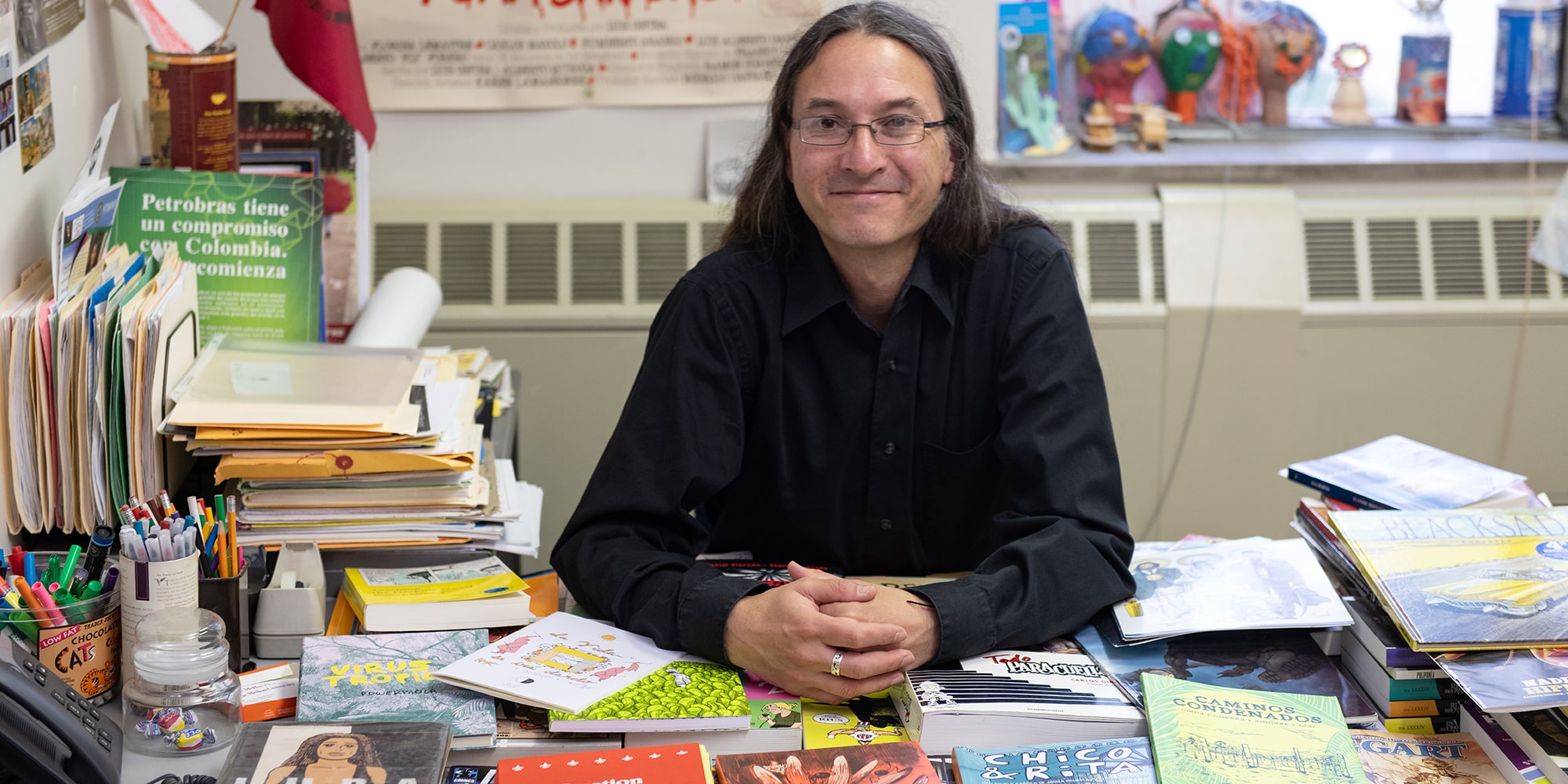CMU Celebrates its Best Teachers, Advisers and Mentors
Carnegie Mellon University honors faculty and staff for their exceptional contributions in teaching, advising and mentoring with its annual Celebration of Education Awards. The awards recognize the accomplishments of those who exemplify the university's standards of excellence in education, and celebrates CMU’s distinguished faculty members and educators for their outstanding contributions and devotion to the university.
This year’s recipients are:
- Amy Burkert, Robert E. Doherty Award for Sustained Contributions to Excellence in Education;
- Barry Luokkala, William H. and Frances S. Ryan Award for Meritorious Teaching;
- Ana Maria Ulloa-Shields, Award for Outstanding Contributions to Academic Advising and Mentoring;
- Philip LeDuc, Barbara Lazarus Award for Graduate Student and Junior Faculty Mentoring;
- Felipe Gómez, Teaching Innovation Award; and
- Kim Hyatt, Teaching Innovation Award.
- Carrie Doonan, Lynley Doonan, Emily Drill and Natalie McGuier, Team Teacahing Innovation Award.
Alexis Adams and Surya Aggarwal are this year’s Graduate Student Teaching and Graduate Student Service Award winners, respectively.
The 2020 award ceremony originally planned for April 30 has been postponed. An event will be hosted during the upcoming academic year to recognize this year's recipients.
For over 30 years, Amy Burkert has challenged herself and others to creatively deliver an exceptional educational experience for every student at Carnegie Mellon.
Burkert joined CMU’s Mellon College of Science (MCS) in 1983. She served in many roles, including as a teaching professor and associate head in the Department of Biological Sciences, assistant dean of Educational Initiatives and director of the Health Professions Program (HPP). As director, she re-envisioned a new model for the HPP, an advising and resource program that empowered students from across the university to explore their interests in the health professions and realize their professional aspirations.
Her experience advising students from a range of majors gave her a strategic vantage point to not only understand our unique curricula but also to identify needs and new opportunities. Partnering with colleagues, she helped to establish the interdisciplinary Bachelor of Science and Arts degree, the Science and Humanities Scholars Program, the unified major in Biological Sciences and Psychology, the Healthcare Policy and Management minor, and the Biomedical Engineering minor for non-engineering students.
In 2010, Burkert transitioned to her current role as Vice Provost for Education (VPE). She brought to that position her passion for curricular innovation, talent in interdisciplinary collaboration and an unwavering dedication to student success.
Andreea Ritivoi, professor and head of the Department of English, said Burkert has had a transformative impact on the culture of CMU by offering a deep and broad knowledge of the university’s educational needs and a vision for what a comprehensive education should offer.
“Her approach is always open-minded and creative; collegial and collaborative; data-driven and practical,” Ritivoi said in her nominating letter. “She has a gift for always making sure the various stakeholders on campus have weighed in and signed on whatever it is we are developing. She is calm and diplomatic in charged situations. And finally, she is diligent and generous with her time and energy in a way that leaves me in awe of her capacity to respond, so kindly and efficiently, to a vast array of tasks and challenges.”
Enhancing the educational experience of every Carnegie Mellon student is at the core of everything Burkert does. Dr. Amanda Willard, one of Burkert’s alumni supporters for the award said it quickly became clear to her that Burkert is incredibly invested and devoted to the CMU community.
“She is continually lending a listening ear to the student body and spear-heading innovative initiatives with the ultimate goal of better preparing and supporting all students,” Willard said. “I personally would not be where I am today without her support and mentorship and I look forward to continuing to learn from her and aspire to have the same kind of positive impact on my students.”
President Emeritus Jared Cohon believes Burkert’s steadfast and tireless work on behalf of students at CMU makes her most deserving of this award.
“She has put interdisciplinary collaboration at the center of her education initiatives, and she has been a marvelous collaborator. She is a fervent champion for diversity and inclusion. Her entire career — as a teacher and administrator — has been about educational innovation for excellence."
Burkert’s faculty nominators Maggie Braun, Eric Grotzinger and John Lehcozkiy, also praised her many contributions to fostering educational excellence in each role she’s held at CMU.
“Amy is a dedicated, collaborative and impactful leader,” they wrote. “And she should be recognized for her exceptional impacts on the CMU community.”
by Emily Payne
For nearly six decades, the William H. and Frances S. Ryan Award for Meritorious Teaching has annually recognized a Carnegie Mellon faculty member who demonstrates "unusual devotion and effectiveness in teaching." To many, that description fits Physics Teaching Professor Barry Luokkala to a tee.
"Over his almost 40-year career, Barry's dedicated efforts have made him truly one of our stellar teachers," wrote Scott Dodelson, head of the Department of Physics; Curtis Meyer, associate dean of the Mellon College of Science (MCS); Professor of Physics Stephen Garoff; Associate Teaching Professor David Anderson; and senior Eric Lester in nominating Luokkala for the Ryan Award.
After initially joining Carnegie Mellon as a lab demonstrations technician, Luokkala began teaching physics at CMU in 1983. He was quickly given responsibility for the introductory lab course Experimental Physics, and he later worked to develop the Basic Experimental Physics course for students in the Health Professions Program. He also earned his Ph.D. in physics from CMU while teaching and working full-time.
"His success can be marked by the popularity of the courses," Luokkala's nominators noted. "The lab classes are always oversubscribed even as we have built more space for each of the courses."
In addition to designing, teaching and writing textbooks for both of these courses, Luokkala has also leveraged his personal passion for science fiction into developing two courses based around connecting the science and technology seen in films to what's possible in the real world.
Students are asked to decide, by reasoning or by calculation, whether or not the scenarios in the films are based on good science," Luokkala said in describing the class. "Students in the course always enjoy being able to engage the subject matter in this way and the lively discussion that occurs."
The full version of Science and Science Fiction attracts many students from outside MCS and routinely has long waitlists. Its innovative success gave Luokkala the opportunity to write a textbook that is now used at two other universities and led him to being invited to a national science fiction conference.
Outside of teaching, Luokkala has played a pivotal role in leading the Pennsylvania Governor's School for the Sciences at CMU and in mentoring dozens of undergraduate, graduate and high school students.
"Throughout my career, from my earliest years as a student and even to the present day, I have been blessed with a series of outstanding role models and mentors," Luokkala said. "My role as a teacher is to do for my students what was done so well for me over the years — to do all I can to encourage the next generation to be the best that they can be."
by Ben Panko
Award for Outstanding Contributions to Academic Advising and Mentoring
Ana Maria Ulloa-Shields, Associate Dean for Student Success, Academic Advisory Center, Dietrich College
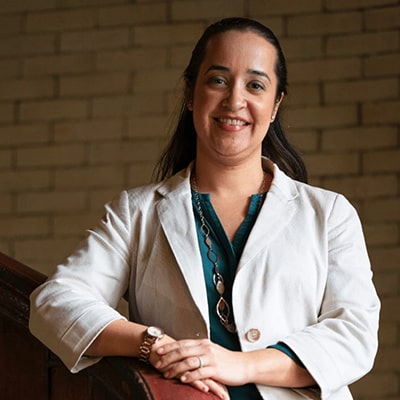 Ana Maria Ulloa-Shields has had a transformative impact on Dietrich College of Humanities and Social Sciences’ advising model. This approach supports students throughout their undergraduate experience, covering academics, experiential learning, and personal and professional development.
Ana Maria Ulloa-Shields has had a transformative impact on Dietrich College of Humanities and Social Sciences’ advising model. This approach supports students throughout their undergraduate experience, covering academics, experiential learning, and personal and professional development.
“Advisors are now expected to help students holistically across all four years. This has worked, and it has moved the needle with the students as well,” said Richard Scheines, Bess Family Dean of the Dietrich College. “When Ana Maria took over in 2015, Dietrich was in the middle of the pack on student satisfaction with advising. Now we are at the top.”
As associate dean for student success, Ulloa-Shields serves as the primary academic advisor for a cohort of students, and she collaborates with advisors across the college to ensure that all Dietrich students receive the help and guidance they need.
“Ana Maria offers models for inclusive practices that lift students' spirits as valued members of the Dietrich community,” said Jennifer Keating, Dietrich College’s assistant dean for educational initiatives. “She remembers students' names, reminding each student with whom she engages, whether in her office or at college-level events, that they are visible and valued.”
When needed, Ulloa-Shields partners with families and/or guardians to ensure a student's academic and personal health. Her efforts extend to building relationships and communicating effectively faculty, ranging from one-on-one interactions to organizing workshops on teaching first-year students.
Ulloa-Shields facilitates students' exploration of academic offerings in the college and throughout CMU, and she has played a critical role in developing new experiential learning opportunities like Dietrich College’s Pittsburgh Summer Internship Program. In its first year, the program placed 24 students at 12 organizations throughout Pittsburgh. Now in its third year, the program has matched 60 Dietrich College students with Pittsburgh-based nonprofit, government and startup organizations.
Ulloa-Shields also is recognized for elevating the role of advising within the college and building a community of practice among colleagues.
“Ana Maria supports Dietrich’s advising by providing effective mentoring and professional development
for our whole set of advisors,” said Sharon Carver, Dietrich College’s associate dean for educational affairs. “She keeps them up to date on university-level policies and current training opportunities, advocates for them at the college and university level, and seeks ways to recognize their accomplishments and provide advancement opportunities.”
by Abby Simmons
Philip LeDuc is known as a mentoring “superstar” for junior faculty, graduate students and undergraduate student researchers. He combines patience, kindness and generosity to support, encourage and empower students and faculty, both educationally and spiritually. He has a passion to help people achieve and succeed.
In their nomination letter, Allen Robinson, head of the Mechanical Engineering Department, and professors Jonathan Cagan, Edward Rubin and Jeremy Michalek, said LeDuc’s interplay of excellence in research, teaching, service and advising make him a truly excellent mentor.
“Many students and faculty describe Phil as the best mentor they have had, and describe him as a lifelong friend and mentor, someone they trust to provide thoughtful advice and help long after they have graduated or earned tenure,” they said.
His nominators and supporters credit LeDuc for his efforts in fostering a diverse and inclusive community within the College of Engineering and the engineering field at large. At least one-third of the more than 120 undergraduate and Ph.D. students he has advised are women and a significant number are under-represented minorities.
“Phil has had a huge impact on the recruitment, retention and promotion of minority scholars to engineering. He is deeply and personally invested in improving and developing the pipeline of minority scholars for the future diversity of the engineering workforce and academe,” they said.
In a supporting letter, Shawn Blanton, the Trustee Professor of Electrical and Computer Engineering at CMU, said LeDuc is often sought out to be the adviser for junior faculty. His mentorship skills are well-known.
“He meets with his mentees on a regular basis, but not just as colleagues, but as someone who cares about their long-term success,” Blanton said. “He helps them with all kinds of different skills, from how to teach classes, to how to efficiently use time, and helps them with proposals, papers and how to deal with challenging situations.”
Former CMU professor C. Fred Higgs III, called LeDuc a “superstar professor who religiously believes in mentoring people.”
“He is the ‘gold standard’ for research-productive professors who aim to elevate and mentor their colleagues and students to become over-achievers in engineering while maintaining a work-life balance,” said Higgs, a mechanical engineering professor and vice provost for Academic Affairs at Rice University. “A supreme encourager, he is one of the reasons I hold leadership positions now.”
Lina Gonzalez, a postdoctoral associate at MIT, had LeDuc for a mentor as a mechanical engineering graduate student at CMU. She praised him for his kindness, patience and guidance.
“When I think of the type of mentor I want to be, I think of Phil,” she said in a supporting letter. “He inculcated in me a sense of confidence. Under Phil’s supervision, I learned how to be a better scientist and engineer.”
by Bruce Gerson
Comics, coding and Hispanic culture: all of these attributes can be found in the innovative courses led by Felipe Gómez. Gómez’s courses, such as “Superheroes and Beyond: Spanish Language Comics in Digital Humanities” and “Comics, Community, and Coding: Electronic Textuality and Culture in Latin America,” help students learn a new language of code while developing their skills in Spanish language acquisition.
Gómez’s classes integrate digital humanities and Hispanic studies through an online platform he created called the Latin American Comics Archive. Students are taught the basics of Comic Book Markup Language (CBML) to code and analyze the literal and symbolic language of comics.
For his work on the Latin American Comics Archive, Gómez was awarded “Best Formative Initiative Developed in 2018” by the Hispanic Digital Humanities, an international professional organization that fosters digital humanities projects in the area of Hispanic Studies globally.
Susan Polansky, head of the Department of Modern Languages, emphasized the varied interdisciplinary aspects present in Gómez’s courses.
“In addition to engaging students with cultural content that explores popular culture, politics, social, historical, and economic circumstances,” Polansky said, “Felipe has guided students to develop their proficiency in Spanish and build their experience in the digital humanities.”
Gabriele Maier, an associate teaching professor of German, believes Gómez is bringing a greater appreciation of comics and graphic novels as a valuable literary genre.
“Felipe cleverly draws interest in and experience of comics many students might have and encourages them to view their youthful passion in a different light,” Maier said.
Innovation is not without compassion. Alumna Haili Adams describes a unique situation where the class schedule of her major conflicted with the required 400-level courses needed for her minor in Hispanic studies.
“To solve this issue, Professor Gómez offered to enroll me in his 300-level course, while changing certain course aspects to satisfy the necessary workload and rigor of a 400-level course,” Adams said. “For this reason, I was already impressed with his dedication to teaching before even stepping foot into the classroom.”
Adams continued, “Professor Gómez continually demonstrated a passion for teaching the entire time I was in his class. He worked tirelessly to design course material that integrated history, society, computer science, and comics.”
by Cameron Monteith
Teaching Innovation Award
Kim Hyatt, Associate Teaching Professor, Heinz College of Informations Systems and Public Policy
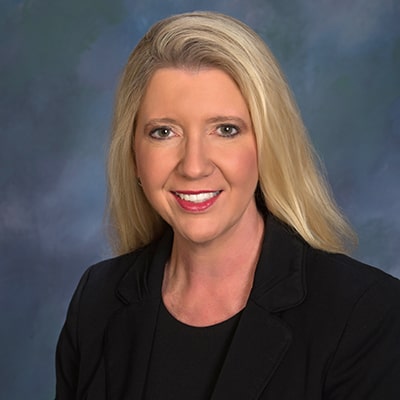 Kim Hyatt, an associate teaching professor in the Heinz College, developed Re-Present, a virtual reality public speaking application that uses artificial intelligence and machine learning to help users identify their strengths and weaknesses in front of an audience.
Kim Hyatt, an associate teaching professor in the Heinz College, developed Re-Present, a virtual reality public speaking application that uses artificial intelligence and machine learning to help users identify their strengths and weaknesses in front of an audience.
Her system places the user into a virtual public speaking setting and captures data about their performance (e.g., eye contact, pace, hand gestures, time, voice inflections, pauses, filler words). Then, the app allows users to watch an avatar give their presentation, so they can evaluate it and decide what to practice next. In this way, users learn to see how others perceive them, a shift in perspective that is key to effective communication.
“Kim’s system has immediate implications for classes beyond her own discipline,” said Jessica Hammer, an assistant professor of learning science in the Human-Computer Interaction Institute and Entertainment Technology Center. “In any field where students must present their work, they can benefit from an opportunity to improve their performance.”
Hyatt’s system also offers the opportunity for critical research on pedagogy. For example, the system can detect how much a speaker looks at a particular audience member.
“This feature allows the design of anti-bias training, for example, by tracking how often the speaker looks at male vs. female, old vs. young, or black vs. white audience members, and giving the speaker the chance to engage in reflective practice,” Hammer said.
As a student in Hyatt’s Strategic Presentation Course, Andreya Cherry has seen how the VR app engages students and increases their success.
“When I signed up for a presentation-based course, I certainly did not expect to be working in VR,” Cherry said. “With this technology, the course transforms from just a required course to an exciting chance to try something new. Because students receive instant feedback, they can begin to improve immediately, such as improving eye contact and lessening their filler words.”
Now that Cherry is a teaching assistant, she hears the students’ initial reactions to the VR app and sees their progress throughout the course.
“Students are often surprised how similar the VR classroom is to the actual classroom and remark that they feel as nervous as they do in the classroom,” Cherry said. “In my position, I hear the student speeches in the classroom and then again in the VR lab. In the lab, I hear the students gain confidence each time they practice their speeches.”
Ramayya Krishnan, dean of the Heinz College, said what makes Hyatt’s educational innovation truly deserving of this teaching award is that it is tackling a problem faced by so many at the university.
“It is going to have enormous impact and help many students and faculty,” Krishnan said. “And it demonstrates the importance we at CMU place on developing the student as a complete individual — excellent in their discipline of study and outstanding at communication.”
by Kelly Saavedra
Team Teaching Innovation Award
Carrie Doonan, Director of Undergraduate Laboratories
Lynley Doonan, Special Lecturer
Emily Drill, Assistant Teaching Professor
Natalie McGuier, Assistant Teaching Professor
Department of Biological Sciences
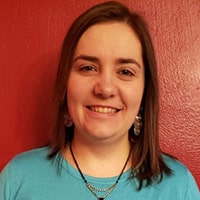
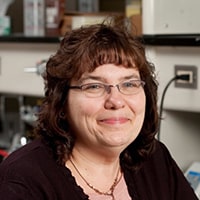 For the lab instructor team behind the new introductory lab course Frontiers, Analysis and Discovery in Biological Sciences (FADS), the class is about more than just exposing first-year Mellon College of Science (MCS) students to hands-on concepts in biology.
For the lab instructor team behind the new introductory lab course Frontiers, Analysis and Discovery in Biological Sciences (FADS), the class is about more than just exposing first-year Mellon College of Science (MCS) students to hands-on concepts in biology.
"The most important innovation of FADS is the way that this course develops community building," Veronica Hinman, head of the Department of Biological Sciences, wrote in nominating the team.
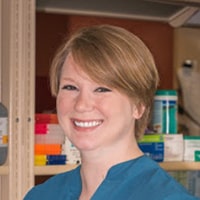
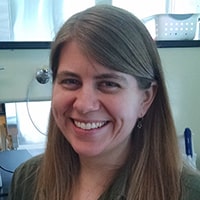 The instructors achieve this by bringing together the first-year students with juniors in the Experimental Techniques in Molecular Biology lab course. Together, these teams of students present to each other on important things they've learned from their research and work together to analyze it.
The instructors achieve this by bringing together the first-year students with juniors in the Experimental Techniques in Molecular Biology lab course. Together, these teams of students present to each other on important things they've learned from their research and work together to analyze it.
Both first-year and junior students attested to the value of these interactions.
"I was able to foster relationships with upperclassmen who I can always turn to for advice and wisdom about situations and dilemmas that I experience during my time at CMU," first-year Veronique Wright wrote in supporting the nomination.
"In addition to providing a helpful research experience," junior Cassie Bishop added, "the instructors of the FADS course generated a lasting mentorship and community between upperclassmen and underclassmen biological sciences students that was previously lacking within the department through a seamless integration of the two lab courses."
In describing their teaching strategy, the lab instructors notedthis collaborative arrangement could be extended to other fields and courses outside of the Department of Biological Sciences and MCS.
"While it took additional time and planning on the instructors’ part, the benefits provided a unique rewarding experience for students and instructors," they noted.
Beyond getting to know their peers better, FADS also lets first-year students meet with Biological Sciences tenure-track faculty to learn about their work and careers in research and academia.
When it came to academic performance in FADS, analysis by the lab instructors in conjunction with the Eberly Center found "statistically significant improvement on generating figures and tables, correctly interpreting data, and correctly explaining the purpose and significance of this data" over the course of the semester.
And at a more basic level, the instructors and nominators all noted the confidence that FADS instilled in students — in their sense of belonging at MCS and in scientific research.
"My first semester of college would not have been half as wonderful if I had not had the opportunity to experience lab with [the FADS instructors] and my fellow peers," Wright said.
Pictured above are (clockwise from top left) Carrie Doonan, Lynley Doonan, Natalie McGuier and Emily Drill.
by Ben Panko
Graduate Student Teaching Award
Alexis Adams, Second Language Acquisition, Department of Modern Languages, Dietrich College
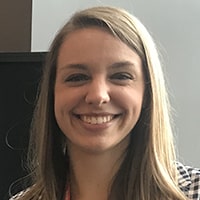 Alexis Adams, a Ph.D. candidate in Second Language Acquisition in the Department of Modern Languages, has taught courses in the English and Modern Language departments at the Pittsburgh campus, as well as in the Summer College Preview Program at Carnegie Mellon in Qatar. As an instructor and researcher, she values reflection and strives to create an inclusive learning environment for students. In particular, she focuses on creating learning opportunities during class discussions to support students’ language and content skills.
Alexis Adams, a Ph.D. candidate in Second Language Acquisition in the Department of Modern Languages, has taught courses in the English and Modern Language departments at the Pittsburgh campus, as well as in the Summer College Preview Program at Carnegie Mellon in Qatar. As an instructor and researcher, she values reflection and strives to create an inclusive learning environment for students. In particular, she focuses on creating learning opportunities during class discussions to support students’ language and content skills.
Most recently, Adams collaborated with the Eberly Center to design a discussion method for international students in a first-year writing course and has used her research to facilitate workshops about discussion practices at university and national conferences. She was recently awarded the Dietrich College Graduate Student Teaching Award for her innovative project.
Adams also works as a senior graduate teaching fellow at the Eberly Center, where she supports other graduate student instructors through observations, workshops and consultations. In addition, she works as an assessment fellow on a team that is assessing the undergraduate Gen-Ed program in the Dietrich College.
Adams completed her master’s degree in teaching and a bachelor’s degree in linguistics and Hispanic Languages and Literature at the University of Pittsburgh. She plans on defending her dissertation this spring and hopes to continue to a career in teacher education.
Graduate Student Service Award
Surya Aggarwal, Department of Biological Sciences
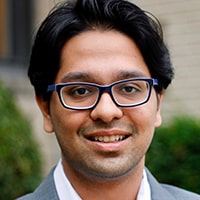 Surya Aggarwal, a Ph.D. candidate in the Department of Biological Sciences, has served as president of CMU’s Graduate Student Assembly, fostering efforts to benefit both graduate and undergraduate students. He fostered partnerships with university stakeholders to launch an on-campus legal consultation program and was involved with numerous other GSA initiatives including assessing the mentorship climate and providing childcare support for graduate students.
Surya Aggarwal, a Ph.D. candidate in the Department of Biological Sciences, has served as president of CMU’s Graduate Student Assembly, fostering efforts to benefit both graduate and undergraduate students. He fostered partnerships with university stakeholders to launch an on-campus legal consultation program and was involved with numerous other GSA initiatives including assessing the mentorship climate and providing childcare support for graduate students.
Prior to serving as president, Aggarwal was vice president for External Affairs for the GSA, taking on leadership roles at the national level as Chair of the Advocacy Board and as an International Student Concerns Advocate for the National Association of Graduate-Professional Students. While in that role, he co-led the national campaign to advocate against the provision of the federal tax bill that proposed to tax graduate student tuition waivers.
Aggarwal also has served on numerous university and departmental committees. He completed his master’s degree from the University of Edinburgh in the United Kingdom and his bachelor’s degree from Amity University in India.

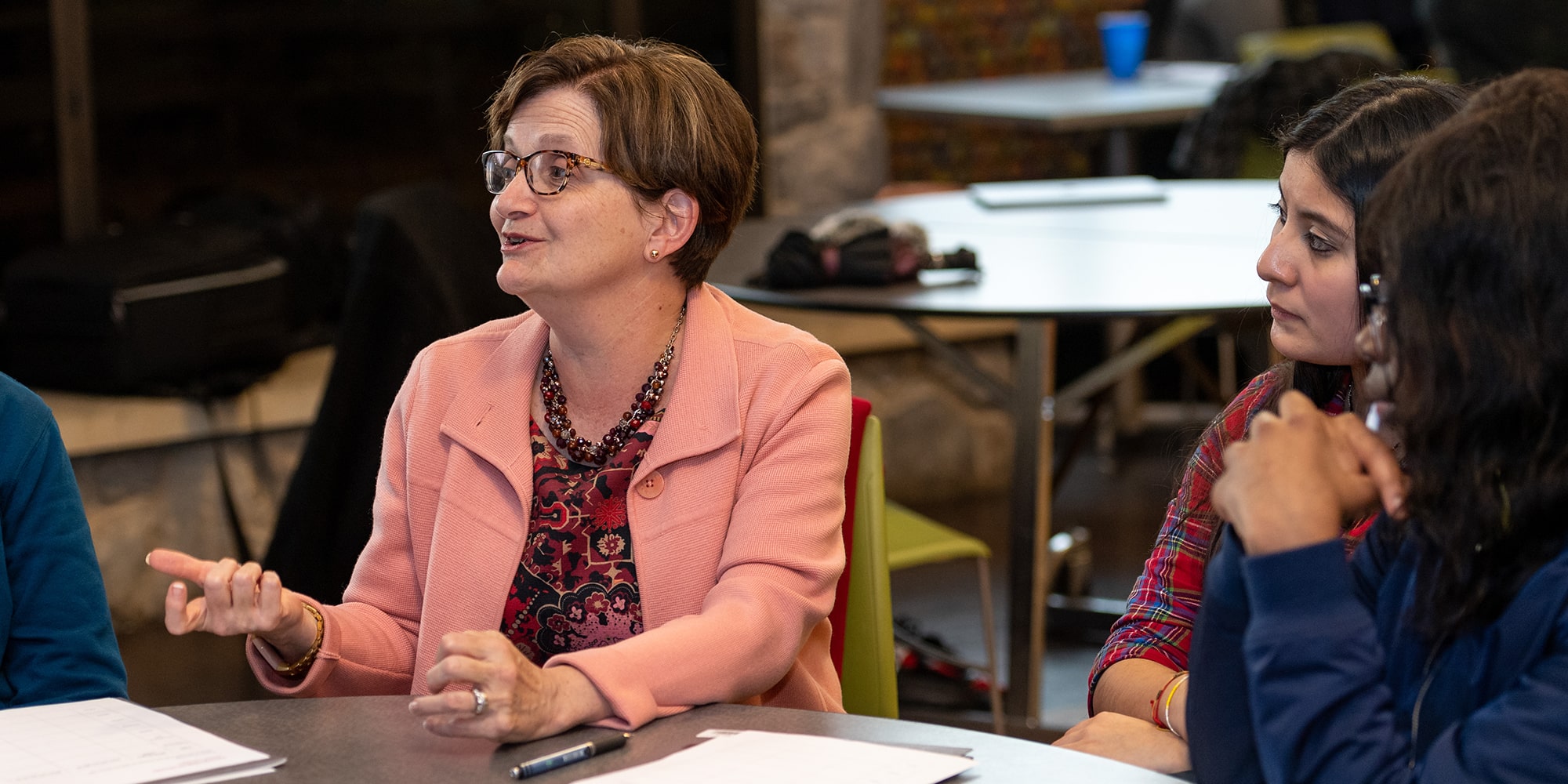
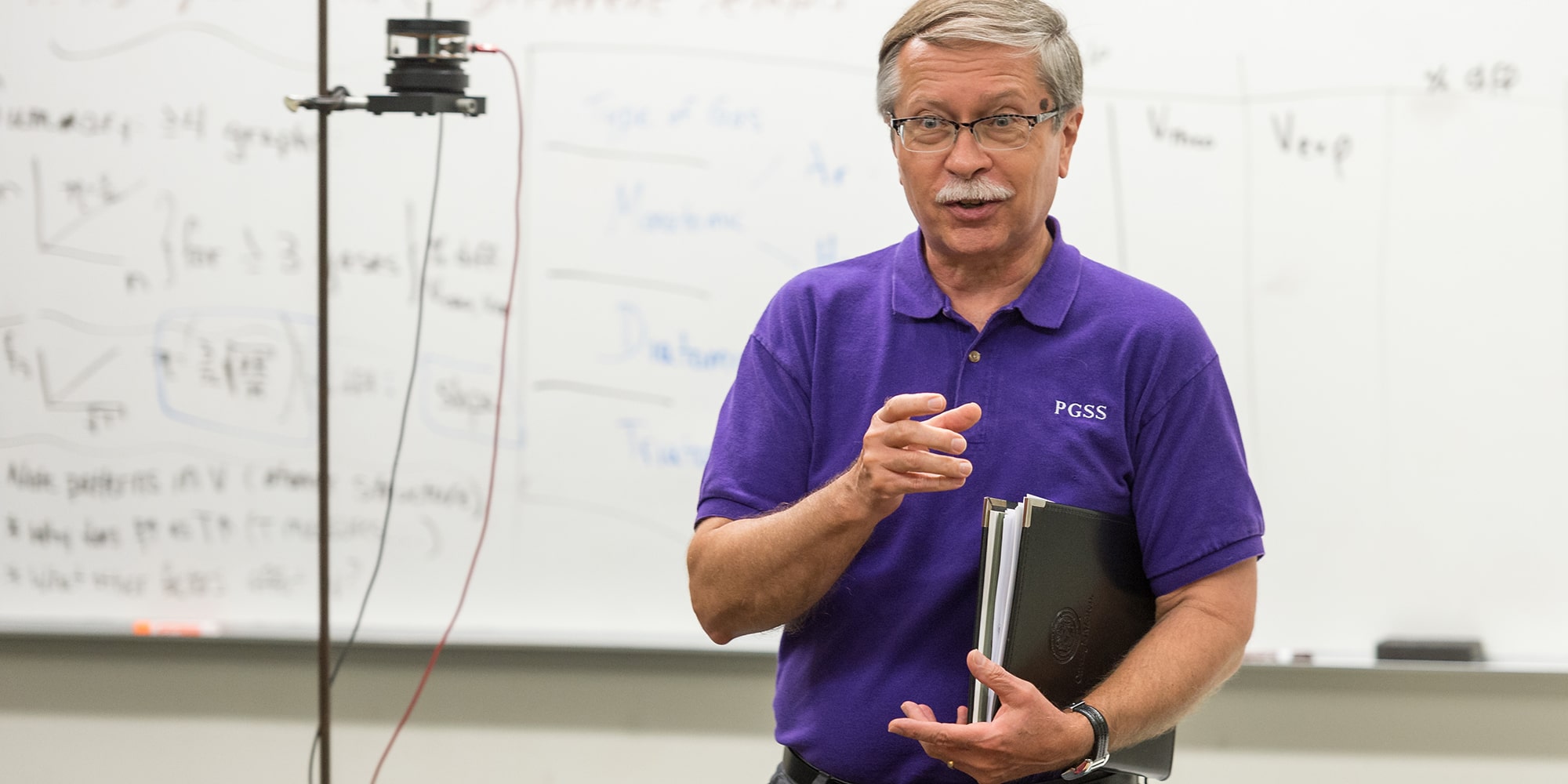
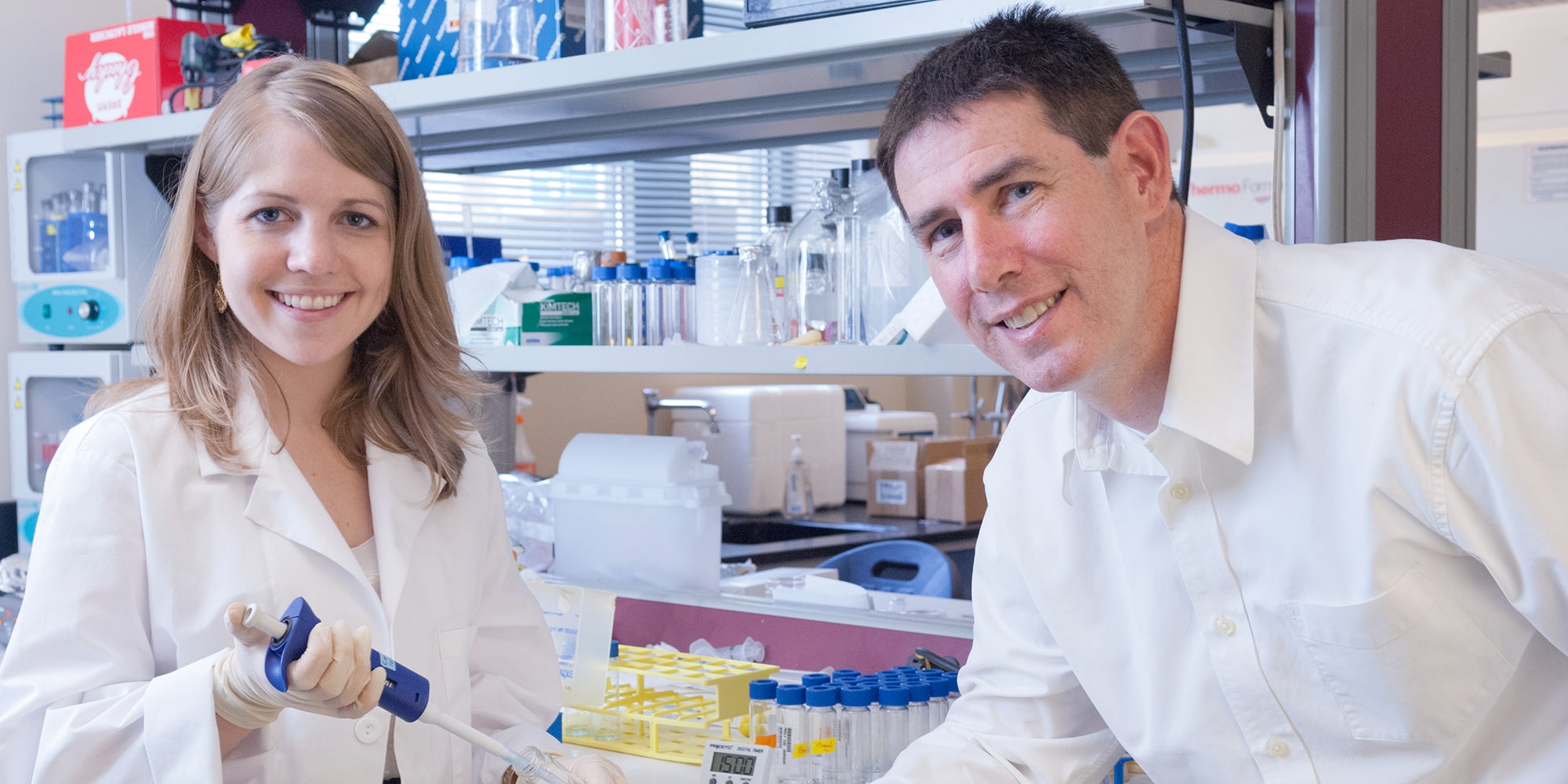 Phil LeDuc and Mary Beth Thanhouser
Phil LeDuc and Mary Beth Thanhouser